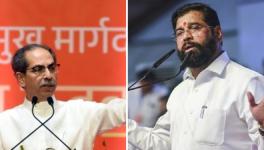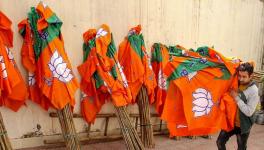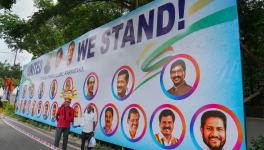New India: We Must Not Use Plastic, But They Can Buy MLAs
My radical Leftist friend was riveted to the TV mounted on the wall of the coffee shop, watching the anchor breathlessly relay the happenings in Mumbai. She and I had fixed an early morning meeting on November 23, obviously unaware that Devendra Fadnavis would be sworn-in as chief minister and Ajit Pawar as his deputy on that day.
“It is a coup, a constitutional one,” I said facetiously.
My radical Leftist friend gave me a withering glance and muttered, “At the stroke of the midnight hour, when the world sleeps, India will awake to life and freedom.”
“Nehru,” I said, identifying the famous speech of the India’s first prime minister and noting the sarcasm in her voice.
She was back to listening to the TV anchor speculate the chances of Fadnavis and Pawar mustering the support of 145 MLAs, the number they need to muster majority in the Maharashtra Assembly. Disinterested in tracking the number game and keen on conversation, I said, “Relax. It will take a few days to purchase the loyalty of MLAs and split political parties.”
She frowned, took a sip of the coffee and said, rather mysteriously, “We are told to throw garbage in the bin. We are told not to use plastic.”
“What’s that?” I asked, unable to comprehend her remark in the backdrop of political shenanigans in Maharashtra.
“We must not use plastic, but they can buy MLAs,” she said. “We must not litter, but they can be corrupt.”
I said this was not the first time in India’s electoral history that a governor had sworn-in a chief minister who did not enjoy the majority support in the Assembly. I reminded her about governors and Supreme Court judges who were only too eager to do Indira Gandhi’s bidding.
“Yes,” she said. “But we are told we are living in a New India.”
I blinked at my radical Leftist friend, still unable to figure out the connection between the campaign against plastic and the political developments in Mumbai. Infuriated at my inability to join the dots, she took off: Did I think the New India was about growth and development, about which the less said, the better? Wasn’t the New India a little more than about tackling about the menace of corruption and black economy?
I did not immediately ask my radical leftist friend about her perception of the New India, assailed as I was by the images of serpentine queues outside banks and ATM vends in the weeks after Modi announced his decision, in November 2016, to remove high denomination notes from circulation. Stories of people dying in queues flashed, as did the pictures of deserted bazaars, of daily wage-earners unable to find employment.
“I get the point,” I said. Trying to imitate her sarcastic tone, I said, “You do not use cheque or bank draft to buy the support of MLAs.”
My sarcasm did not get her to even smile. She said the philosophy underlying the idea of New India was to change people’s behaviour, to turn their focus from their selfish self to the nation, to work for the larger public good. This was the ideational foundation of the New India, where morality, altruism and change were to go hand-in-hand. She spoke of the Modi government’s campaign that asked people who could afford to pay the market price for the LPG cylinder to voluntarily relinquish their subsidised connection. Over 10 million people surrendered their connection to enable the poor families to avail of cheap cooking gas, she cited government figures.
“All of us are supposed to change our behaviour,” she said, pausing and adding, “Except them.”
“The BJP, you mean,” I said, finally understanding what she had implied when she said, “We must not use plastic, but they can buy MLAs.” Obviously, we are stuck in the old India because of the BJP—when MLAs are bought over, the money spent has to be recouped. Policies are, therefore, tendentiously framed to recover the investment. The circle of corruption remains intact.
“It is the old India with a new label,” I said.
My radical leftist friend said this New India was not even the old one. There are features of New India that were not present or so pronounced in the India of, say, 40 years ago. To reference her claim, she said she could figure out what the BJP’s game-plan in Maharashtra was. Since Ajit Pawar was the Nationalist Congress Party’s legislature party head, a letter of support from him for Fadnavis will have the BJP to claim that the governor was legally right to swear-in both leaders.
“In the old India, the political class was brazen,” she said. “In the New India, rules are invoked to violate them.”
She was, obviously, alluding to how the BJP invoked Article 370 to read it down.
My radical Leftist friend said this had not been done just in the instance of Kashmir. For a good four years, the Central government deliberately misread the Constitution to deny even the limited powers to the Aam Aadmi Party government in Delhi, until the Supreme Court ruled that such an interpretation was wrong. This is evident in the investigating agencies invoking the due process to pack off political and ideological rivals to jail.
“It is lawlessness, by the rule of law. Go figure,” my radical Leftist friend said.
“Maharashtra is a metaphor for the New India?” I asked.
“In more ways than one,” she replied. She said the BJP fought the Maharashtra Assembly elections on the issues of Article 370 and the Indian Air Force strikes in Balakot. Does it matter to farmers in Maharashtra whether Jammu and Kashmir is a State or a Union Territory? The BJP insulted leaders such as Sharad Pawar, stomping upon regional pride. It relentlessly pursues the politics of polarisation—targeting Muslims or a dominant caste not on its side. She spoke of an all-India exercise to prepare the National Register of Citizens and the Supreme Court judgment in the Ayodhya dispute and its consequences for the future.
My radical leftist friend kept the coffee cup on the table and said, “Modi’s New India is a weird India.”
Ajaz Ashraf is a freelance journalist. The views are personal.
Get the latest reports & analysis with people's perspective on Protests, movements & deep analytical videos, discussions of the current affairs in your Telegram app. Subscribe to NewsClick's Telegram channel & get Real-Time updates on stories, as they get published on our website.























